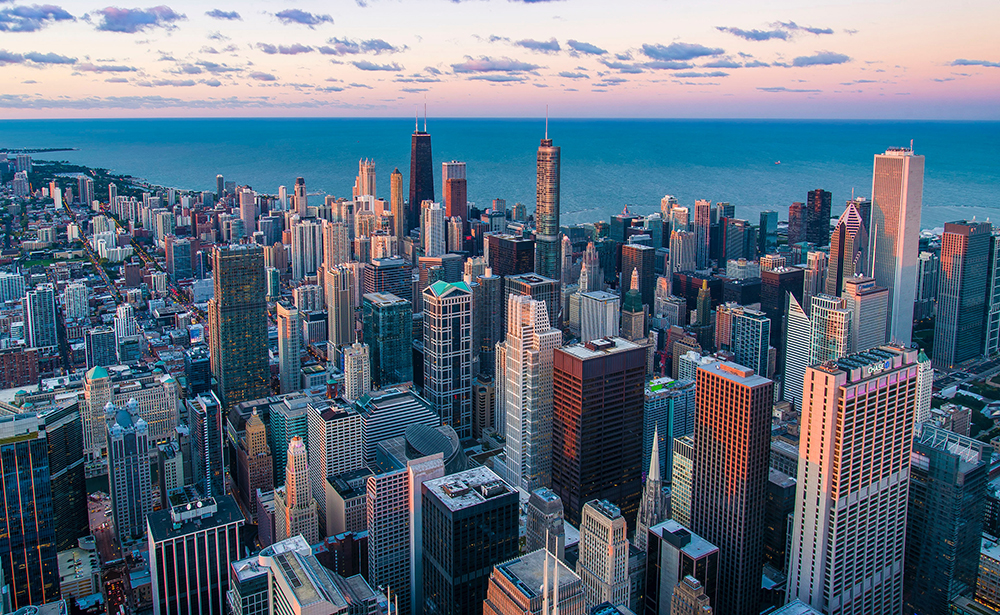
Donald Trump turned heads last week when he praised people who adhere to the QAnon conspiracy theory that claims Satan-worshipping paedophiles in powerful positions around the globe are gunning for the US president.
“These are people that love our country,” Mr Trump said at the White House. “They like me very much.”
Mr Trump was commenting after Marjorie Greene, a QAnon proponent, won a Republican primary in Georgia, before later distancing herself from the theory. She will almost certainly beat her Democratic opponent in the conservative district on November 3 — the same day that Mr Trump will face Joe Biden in the presidential election.
After Mr Trump called Ms Greene a “future Republican star”, Liz Cheney, the third-highest ranking Republican in the House of Representatives, said QAnon was “dangerous lunacy” that had no place in politics. Ben Sasse, a Nebraska Republican, went even further: “QAnon is nuts. And real leaders [would] call conspiracy theories conspiracy theories. If Democrats take the Senate in November, blow up the filibuster and pack the Supreme Court, garbage like this will be a big part of why they won.”
The two conservatives were among only a handful of Republicans who were publicly indignant, illustrating a conundrum for the party as it opens its political convention on Monday. Candidates such as Ms Greene pose a threat to the broader future of the 166-year-old party. But they enjoy the strong support of Mr Trump and his base — the ultra-conservative segment of the Republican electorate which is most active in primary races.
Donald Trump has called Marjorie Greene, a QAnon proponent, a ‘future Republican star’ © MIke Stewart/AP
Ms Greene’s stunning victory has highlighted a question that will have a big impact on the US and potentially the world. If Mr Trump loses the election, will the Grand Old Party recalibrate and return to a more moderate pre-Trump Republican party. Or has Mr Trump so remoulded the party in his image that future congressional contenders will have to embody Trumpism, raising the spectre that he will remain a potent presence in American politics for years to come.
Charlie Sykes, an influential conservative critic of Mr Trump, is in no doubt: “There is no going back after four years of Trump”, he says.
“It’s not just that he has changed the party, the party has changed itself. We have a voter problem. We’ve already had a fight for the soul of the Republican party, [during the 2016 race] and lost,” Mr Sykes says. “Now we’re just haggling over the spoils.”
Grassroots appeal
After Mitt Romney lost to Barack Obama in 2012, the Republican party concluded it had to do more to attract minorities, particularly Hispanics. That helped propel the consensus view that Jeb Bush, the Spanish-speaking former Florida governor, would become the Republican presidential nominee in 2016.
The party was stunned when Mr Trump, a political neophyte who called Mexican immigrants murderers, won the primary by stoking racial divisions with an anti-immigration platform targeting Hispanics and Muslims.
Laura Loomer, a far-right Republican candidate, celebrates winning a primary race in Florida © Allen Eyestone/Palm Beach Post/AP
Christine Todd Whitman, a former Republican New Jersey governor who last week endorsed Mr Biden, says Mr Trump had enabled the spread of racism in ways that would create long-term damage to the Republican party. “There’s always been racism in this country. But he made it OK to say things that you never said or acted out openly before,” says Ms Whitman. “It’s going to be very hard to put that back in the box.”
Mr Trump shows no sign of changing. Last week, he tweeted “great going” after Laura Loomer, a woman who calls Muslims savages and has been banned from social media platforms, won a Republican primary race in Florida.
Ms Loomer and Ms Greene exemplify the dilemma facing the Republican establishment. While more traditional Republicans believe they hurt the party in the long run, they are reluctant to speak out because Mr Trump supports candidates who emulate his anti-Washington outsider persona. And they know that much of the conservative party base supports the nativist views of Mr Trump and are quick to punish disloyalty.
Susan MacManus, a political expert in Florida, says the party is deeply divided. She says Republicans in rural areas are attracted by Mr Trump’s defiant attitude towards the Washington establishment.
“Laura Loomer is getting a lot of attention because she is defiant. And the more people try to stifle her freedom of speech, the more they like her,” says Ms MacManus. “But the problem that causes for Republicans in more metropolitan areas . . . is that it makes it harder for them when they face competitive races against Democrats.”
Moderate Republicans worry about the lasting impact of Trump’s presidency on the 166-year-old party © Caroline Brehman/CQ-Roll Call, Inc/Getty
‘A lasting Trump imprint’
The intense polarisation in Washington has made it all but impossible for Republicans to straddle both sides of the party.
“It’s very binary right now. You’re either for Trump or you’re not,” says Eric Cantor, the former Republican House leader, adding that any perceived weakness in support for Mr Trump risked a backlash from the party grassroots in primary races. “It’s become Donald Trump’s party right now. That’s why I think there will be a lasting imprint of Donald Trump.”
Mr Sasse personifies the dilemma. Mr Trump skewered him, in August, after he accused the president of issuing executive orders that were “unconstitutional slop”. Mr Trump tweeted that the Nebraska senator had “gone rogue again”, referring to Mr Sasse toning down his criticism when he faced a primary challenge earlier this year.
Mr Sasse — who belongs to a tiny club of public critics of Mr Trump within the party that is generally limited to Ms Cheney and Mr Romney, the Utah senator — survived the primary challenge from a Trump supporter. Others have been less fortunate. Jeff Sessions, for instance, last month lost his campaign to become the Alabama senate nominee after Mr Trump campaigned against his former attorney-general.
Ms Whitman says many Republicans are trapped. “Their fate is inexorably linked to Trump. If you haven’t said anything before . . . you can’t say anything that’s credible now. You just have to ride the storm.”
Trump supporters in Nebraska. The president’s America First campaign has proved very popular with the Republican party grassroots © Nati Harnik/AP
In the 2016 Republican race, Mr Trump fought fierce battles with Florida senator Marco Rubio and his Texas peer Ted Cruz. While both men have on occasion criticised the president, they have largely joined the group of Republicans who prefer to keep their heads down, partly to protect their own political fortunes, amid expectations that they will both seek the Republican nomination again in 2024. Yet, others such as Tom Cotton, have been almost absolute in their support for Mr Trump who has returned the favour by praising the Arkansas senator.
Mr Sykes says the senators are “putting on Trump masks to see who can inherit the mantle of Trumpism without the narcissism and pussy-grabbing”, referring to one of Mr Trump’s most crude comments ahead of the 2016 election.
“In 2017, I said everything that had been happening with the conservative media and the tribalisation of our politics was going to get worse. But I didn’t actually think we could have QAnon candidates winning our primaries.”
John Kasich, a former Ohio Republican governor who ran against Mr Trump in 2016, says most lawmakers wanted to avoid turbulence. “They wanted to avoid having a lot of disruption in their own districts or their own state because there are fierce Trump supporters who are very intense,” adds Mr Kasich, who publicly endorsed Mr Biden at last week’s Democratic convention.
A shrinking party
The danger for moderate Republicans is that while Mr Trump resonates with the grassroots, he is making it harder to expand the party, as evidenced by the defeat it suffered in the House in the 2018 midterm elections. That problem is particularly acute in the suburbs, as Mr Cantor’s former district in Virginia illustrates.
Mr Cantor was ousted in a primary in 2014 by Dave Brat, a candidate endorsed by the Tea Party, the anti-establishment movement that in some ways was the precursor for Trumpism. Four years later, Abigail Spanberger, a former CIA operative and Democrat, beat Mr Brat in a district that includes suburbs of Richmond that were once much more Republican but have become increasingly Democratic in recent years.
The threat to the party in the suburbs and beyond should underscore the conclusion made after 2012 that it cannot rely on the ultra-conservative base in the long run because of demographic changes.
But Brendan Buck, who served as a senior aide to Paul Ryan before he retired as Republican speaker of the House, says most lawmakers are taking a short-sighted approach.
“I wouldn’t give members too much credit for bothering to think about the broader impact on the party,” says Mr Buck. “Most members and most candidates are focused on what gets them elected to Congress. They are not thinking, how is what I am doing to appeal to my district in rural Ohio impacting the party in Philadelphia.
“Trump has dominated Republican party politics and has great enthusiasm among the base,” he adds. “But he is making us a smaller party in the long term.”
Eyes on 2024
That trend will be even more evident at the Republican convention. While the speakers at the Democratic party equivalent last week showed that the diffuse party had united around Mr Biden, Mr Trump’s convention will showcase far fewer of the moderate Republicans that would normally have spoken at the party’s marquee political event.
One of the highest-profile Republicans to attend the largely virtual convention will be Nikki Haley, a former South Carolina governor who served as Mr Trump’s ambassador to the UN, and who is expected to run for the Republican nomination in 2024. Since leaving the UN job, Ms Haley has generally supported Mr Trump but she has occasionally taken critical stances in an attempt to avoid alienating the more moderate wing in the party.
A big factor that will help determine how Republican contenders position themselves ahead of that 2024 race will be whether Mr Trump wins in November, and also whether Republicans retain control of the Senate.
Recommended
Doug Heye, a former senior aide to Mr Cantor, says that if Mr Trump loses, there will be a “multi-front battle royal for the soul of the party”. That will be especially true should the Republicans also lose the Senate, but he says it will be hard to pivot back to where it was before Mr Trump. “Ultimately we won’t be able to regain our virginity.”
Ms Whitman says a heavy defeat in the Senate might be good for Republicans who want to see a reversal. “A big loss will force people to sit up and say, ‘OK, this isn’t working. We have to reconsider if we ever want to be relevant.’”
Mr Cantor says that regardless of when Mr Trump leaves office, his influence will be hard to erase as parts of his platform, such as America First and opposition to illegal immigration — and undocumented immigrants living in the US — will remain as they are very popular with the grassroots.
But, he adds, losing the Senate would be a big blow. “There would be a real bloodbath within the party to try and understand the direction going forward.”
Bill Kristol, a well-known conservative and one of the most vocal critics of Mr Trump, says a crushing loss in the Senate, or Mr Trump losing Texas in the presidential race, could spark a reckoning. But he adds that he is “pessimistic” about the party even if Mr Trump loses.
“You cannot unsee the Republican enabling of Trump,” says Mr Kristol. “Conventional thinking in Washington is that people will wake up on November 4 and Trump will have exited [politics]. That is not realistic. Fox News is not going away, Trump and his tweets are not going away, his family is not going way.”
While some establishment Republican groups, such as the Lincoln Project, which produces slick videos slamming the president, are trying to oust Mr Trump, they have become a much less powerful voice as the party has changed.
“We’re a very, very small minority in the Republican party today,” says Mr Buck. “There’s a very outsized voice given to the Trump critics on the right that doesn’t exist in a real large way in conservative districts out in America.”
Mr Buck believes Mr Trump could still play a potent role after losing. Unlike his predecessors who generally avoided wading into politics in retirement, he is unlikely to follow suit given his love of attention. And some Republicans stress that even if he loses in November, there is nothing to stop him from running again in 2024.
Mr Sykes says one way to illustrate how strongly Mr Trump has come to dominate the party is to consider one question. “If Donald Trump decided to run again in 2024, which Republican would be able to defeat him in a primary? That answers the question of how difficult the problem is.”
@dimi





More Stories
As the pandemic wreaks havoc on TV and movie ‘love lives’, intimacy coordinators need to find ways to adapt